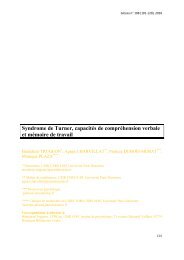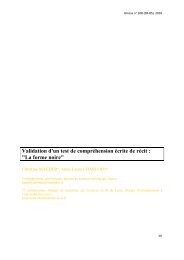Essai d'amélioration des performances sur l'accord du ... - Glossa
Essai d'amélioration des performances sur l'accord du ... - Glossa
Essai d'amélioration des performances sur l'accord du ... - Glossa
Create successful ePaper yourself
Turn your PDF publications into a flip-book with our unique Google optimized e-Paper software.
Résumé :<br />
<strong>Glossa</strong> n° 109 (55-71), 2010<br />
Cette étude s’intéresse au lien existant entre grammaire et logique. Des recherches ayant déjà<br />
prouvé cette corrélation, nous avons créé <strong>des</strong> activités exploitant la relation entre les<br />
<strong>performances</strong> <strong>sur</strong> l’accord <strong>du</strong> syntagme nominal et les schèmes de classification et<br />
d’inclusion. Nous nous demandons si l’application de ces schèmes <strong>sur</strong> <strong>du</strong> matériel<br />
linguistique, permettrait à <strong>des</strong> adolescents dyslexiques-dysorthographiques d’améliorer leurs<br />
<strong>performances</strong> quant à l’accord <strong>du</strong> syntagme nominal. Nous présentons donc nos quatre<br />
activités à deux adolescents dyslexiques-dysorthographiques de 6 ème et de 5 ème , lors de dix<br />
séances, suivant une progression précise. Nous adoptons tout au long de notre protocole la<br />
démarche clinico-critique décrite par Piaget et reprise par Dolle et Bellano (1989). Nous<br />
réalisons une analyse qualitative transversale <strong>des</strong> séances et <strong>des</strong> comparaisons pré et post-tests<br />
(tests concernant l’orthographe grammaticale et le raisonnement logique).<br />
L’ensemble <strong>des</strong> résultats notamment qualitatifs semble confirmer l’adaptation <strong>du</strong> matériel à la<br />
fois à la population ciblée et au but recherché (améliorer l’orthographe grammaticale).<br />
Mots clés : dysorthographie, raisonnement logique, orthographe grammaticale,<br />
métalinguistique, matériel.<br />
Experiment to improve spelling <strong>performances</strong> about the agreement within<br />
the nominal group thanks to linguistic activities proposed to teenagers with<br />
dyslexia and dysgraphia. Analysis of logical reasoning of two teenagers in<br />
6 ème and 5 ème<br />
Summary :<br />
This study aims to explore the link between grammar and logical reasoning. We hypothesized<br />
that using the classification and inclusion schemas with linguistic material would help<br />
teenagers with dyslexia and dysgraphia to improve spelling <strong>performances</strong> about the agreement<br />
within the nominal group. To test this, we <strong>des</strong>igned four linguistic activities that we proposed<br />
to two teenagers in 6 ème and 5 ème . Each of them carried out the activities ten times and<br />
progress was assessed according to a predetermined sche<strong>du</strong>le. These steps respected the<br />
grammatical acquisition order. We analysed participants’pro<strong>du</strong>ction <strong>du</strong>ring the sessions, from<br />
a qualitative point of view, in both grammar and logical reasoning. In addition, we compared<br />
pre-activity performance in grammar and logic with post-activity performance.<br />
The qualitative results among others prove that the material is well adapted to the targeted<br />
population and to the aim of the study (improve <strong>performances</strong> about grammatical<br />
orthography).<br />
Key words : developmental dysgraphia, operation reasoning, grammatical orthography,<br />
metalinguistic approach, material.<br />
57




